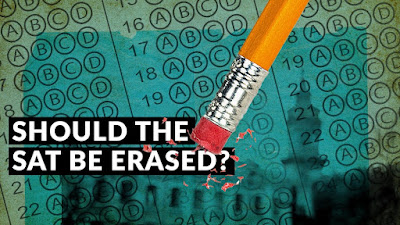It used to be that the SAT (Scholastic Aptitude Test) was the gold standard for college admission. At social events a generation ago, it was common to parents boast about their children's SAT scores.
"Brian scored a 1440."
"Melissa scored a 1450."
"Prisha scored a perfect 1600."
High SAT scores used to be a badge of honor for a family with high school children planning to attend college.
But last year, only 1.5 million high school students took the SAT, down from 2.2 million in the class of 2020. Covid-19 played a big role in the decision among many schools not to move forward with at-home testing. But the move sparked even wider discussion about the test itself. Currently, at least 75 percent of colleges actually don’t require the SAT or ACT. That’s an all-time high, with many schools pledging not to return to it. But is that the right move?
Proponents call into question the efficacy and inequity of standardized tests, pointing to high-profile college admission scandals, as well as those leveraging access to resources to net higher scores. They argue a more expansive approach to admissions is better suited in selecting students. Those who defend the SAT, however, say the test presents opportunities for smart, under resourced students to get into top schools.
Removing such tests could actually make present inequities worse. Additionally, the focus should be on addressing the achievement gap, rather than merely changing the way students are evaluated. Personal essays, GPA, extra curricula, they say, are just as easy to game with financial privilege.
So, in the context of Biden's student debt forgiveness leading to renewed discussions over the value of college, debate podcast Intelligence Squared U.S. asks: Should the SAT be erased?
Intelligence Squared U.S. was founded to address a fundamental problem in America: the extreme polarization of our nation and our politics. Through its award-winning live debates and associated programming, the nonprofit organization serves as a model for responsible media in a new age - fair, intelligent, nonpartisan - while restoring critical thinking, facts, reason, and civility to public discourse.
Arguing yes: Sheryll Cashin, the Carmack Waterhouse Professor of Law, Civil Rights, and Social Justice at Georgetown University. Her book Place Not Race (2014), which recommended radical reforms of selective college admissions in order to promote robust diversity, was nominated for an NAACP Image Award for Outstanding Non-Fiction.
Arguing no: Dr. Freddie deBoer, a writer, editor, and academic. He is the author of The Cult of Smart: How Our Broken Education System Perpetuates Social Injustice (2020), about meritocracy, education, and the potential for a more humane society.
Listen to the podcast at iq2us.org or wherever you get podcasts.
And no, you do not get 400 points for writing your name correctly on the SAT. That's a myth. The minimum score you can receive on the SAT is 600.

Comments
Post a Comment
Thank You for your input and feedback. If you requested a response, we will do so as soon as possible.